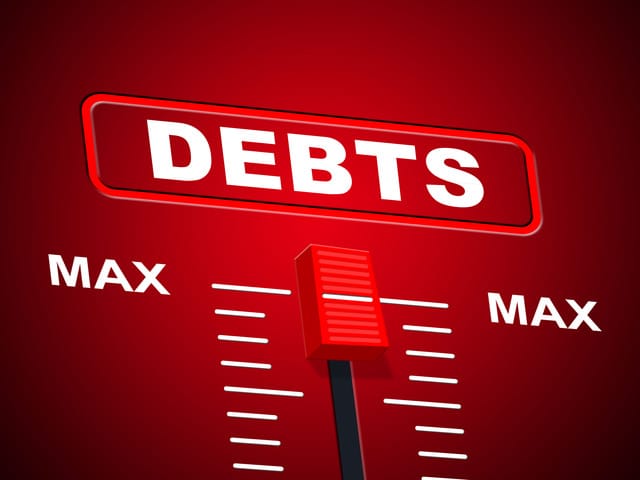Taking Control: 5 Effective Strategies for Successfully Managing Debt
Debt can be a significant source of stress and anxiety for many individuals. However, with the right strategies and approach, it is possible to effectively manage and eventually eliminate debt. In this article, we will discuss five effective strategies for successfully managing debt.
- Create a budget: One of the most crucial steps in managing debt is to create a budget. A budget allows you to track your income and expenses, identify areas where you can cut back on spending, and allocate funds towards paying off your debt. By creating a realistic budget and sticking to it, you can take control of your finances and make progress towards becoming debt-free.
- Prioritize your debts: When dealing with multiple debts, it is important to prioritize them based on factors such as interest rates, outstanding balances, and payment terms. By focusing on paying off high-interest debts first, you can save money on interest charges and make quicker progress towards reducing your overall debt load.
- Negotiate with creditors: If you are struggling to make payments on your debts, consider reaching out to your creditors to discuss potential options for repayment. Many creditors are willing to work with borrowers to create a more manageable payment plan or even negotiate a settlement. By being proactive and communicating openly with your creditors, you may be able to reduce your debt burden and avoid more serious consequences such as default or bankruptcy.
- Cut back on unnecessary expenses: To free up more funds for debt repayment, consider cutting back on unnecessary expenses such as dining out, shopping, or subscription services. By making small sacrifices in your daily spending habits, you can redirect more money towards paying off your debts and speeding up your journey towards financial freedom.
- Seek professional help if needed: If you are feeling overwhelmed by your debt or struggling to make progress on your own, it may be helpful to seek professional assistance. Credit counseling agencies, financial advisors, and debt management programs can provide guidance, support, and resources to help you develop a plan for managing your debt effectively. By enlisting the help of experts in the field, you can gain valuable insights and tools to overcome your debt challenges and achieve your financial goals.In conclusion, managing debt effectively requires a combination of discipline, planning, and determination. By following these five strategies and staying committed to your financial goals, you can take control of your debt, improve your financial health, and ultimately achieve a debt-free future.
Debt-Free Future: Implementing 5 Key Strategies for Debt Management
In today’s uncertain economic climate, many individuals are striving towards achieving a debt-free future. While the road to financial freedom may seem daunting, implementing key strategies for debt management can help individuals take control of their financial well-being. By following these five essential strategies, individuals can pave the way towards a debt-free future:
- Create a budget: One of the most crucial steps in debt management is creating a comprehensive budget. By outlining your monthly income and expenses, you can gain a clear understanding of where your money is going. This will help you identify areas where you can cut back on spending and allocate more funds towards paying off debt.
- Prioritize high-interest debt: When it comes to paying off debt, it’s important to prioritize high-interest debt first. By focusing on paying off debts with the highest interest rates, you can save money in the long run and accelerate your journey towards financial freedom.
- Consolidate debt: If you have multiple debts spread across different accounts, consolidating them into a single loan with a lower interest rate can make it easier to manage your payments. This can help you save money on interest and simplify your debt repayment process.
- Build an emergency fund: Unexpected expenses can derail your debt repayment efforts, so it’s essential to build an emergency fund to cover any unforeseen costs. Aim to save at least three to six months’ worth of living expenses in an easily accessible account to protect yourself from financial setbacks.
- Seek professional help: If you’re struggling to manage your debt on your own, don’t hesitate to seek help from a financial advisor or credit counselor. These professionals can provide personalized guidance and support to help you develop a customized debt management plan.By implementing these key strategies for debt management, individuals can take proactive steps towards achieving a debt-free future. With dedication, discipline, and a solid financial plan in place, financial freedom is within reach.
From Debt to Wealth: 5 Proven Strategies for Managing Debt Like a Pro
Debt can be a significant burden for many individuals and families, but with the right strategies in place, it is possible to turn that debt into wealth. In this article, we will discuss five proven strategies for managing debt like a pro.
- Create a Budget: The first step in managing debt is to create a budget. This will help you understand your income and expenses, and identify areas where you can cut back on spending. By sticking to a budget, you can ensure that you are living within your means and avoid accumulating more debt.
- Prioritize High-Interest Debt: If you have multiple debts, prioritize paying off those with the highest interest rates first. This will save you money in the long run and help you eliminate debt more quickly. Consider using the snowball or avalanche method to pay off debt systematically.
- Negotiate with Creditors: If you are struggling to make payments on your debt, don’t be afraid to negotiate with your creditors. Many creditors are willing to work with you to come up with a payment plan that fits your budget. Be honest about your financial situation and ask for lower interest rates or extended payment terms.
- Build an Emergency Fund: One of the best ways to avoid falling back into debt is to build an emergency fund. Having a financial cushion will help you cover unexpected expenses without relying on credit cards or loans. Aim to save at least three to six months’ worth of living expenses in your emergency fund.
- Invest in Your Future: Once you have paid off your debt, it’s important to continue building wealth for the future. Consider investing in retirement accounts, real estate, or other assets that will grow over time. By making smart financial decisions, you can secure your financial future and avoid falling back into debt.By following these proven strategies for managing debt, you can take control of your finances and start building wealth for the future. Remember, it’s never too late to turn your financial situation around – with dedication and discipline, you can achieve financial freedom.
Financial Freedom: Top 5 Strategies for Effective Debt Management
Debt management is a crucial aspect of achieving financial freedom. By effectively managing your debts, you can reduce financial stress, improve your credit score, and work towards a more secure financial future. Here are five strategies to help you effectively manage your debts:
- Create a budget: The first step in effective debt management is to create a detailed budget that outlines your income and expenses. By understanding your financial situation, you can identify areas where you can cut back on spending and allocate more money towards paying off your debts.
- Prioritize high-interest debts: If you have multiple debts, focus on paying off high-interest debts first. By tackling debts with higher interest rates, you can save money on interest payments in the long run and pay off your debts more quickly.
- Consider debt consolidation: If you have multiple debts with high-interest rates, consider consolidating them into a single loan with a lower interest rate. Debt consolidation can simplify your debt payments and potentially save you money on interest.
- Negotiate with creditors: If you are struggling to make payments on your debts, consider negotiating with your creditors for a lower interest rate or a more manageable payment plan. Many creditors are willing to work with you to help you repay your debts.
- Seek professional help: If you are overwhelmed by your debts, consider seeking help from a financial advisor or credit counseling service. These professionals can provide guidance on managing your debts and creating a plan to become debt-free.By implementing these strategies, you can effectively manage your debts and work towards achieving financial freedom. Remember that debt management is a gradual process, so stay committed and focused on your financial goals.
Debt Demolition: How to Utilize 5 Effective Strategies for Debt Management
Debt management is a critical aspect of personal finance that can have a significant impact on your financial well-being. If you are struggling with debt, it is important to have a plan in place to effectively manage and eventually eliminate it. In this article, we will discuss five effective strategies for debt management that can help you take control of your finances and work towards a debt-free future.
- Create a budget: The first step in effective debt management is to create a budget that outlines your income, expenses, and debt obligations. By understanding your financial situation, you can identify areas where you can cut back on spending and allocate more money towards paying off your debts.
- Prioritize your debts: Not all debts are created equal, and it is important to prioritize them based on factors such as interest rates, outstanding balances, and payment terms. Focus on paying off high-interest debts first, as they can quickly accumulate and become unmanageable.
- Negotiate with creditors: If you are struggling to keep up with your debt payments, consider reaching out to your creditors to negotiate more favorable terms. This could include lowering interest rates, extending payment deadlines, or even settling for a reduced amount. Many creditors are willing to work with you to find a solution that works for both parties.
- Consider debt consolidation: Debt consolidation involves combining multiple debts into a single loan with a lower interest rate, making it easier to manage and pay off. This can help simplify your debt payments and potentially save you money in the long run. However, it is important to carefully consider the terms of the consolidation loan and ensure that it is the right solution for your financial situation.
- Seek professional help: If you are overwhelmed by your debt and struggling to make progress, consider seeking help from a credit counseling agency or financial advisor. These professionals can provide personalized advice and guidance on how to effectively manage your debt and create a plan for becoming debt-free.In conclusion, effective debt management requires a combination of discipline, planning, and strategic decision-making. By following these five strategies, you can take control of your debts, improve your financial situation, and work towards a more secure financial future. Remember that becoming debt-free takes time and effort, but with dedication and perseverance, you can achieve your financial goals.



